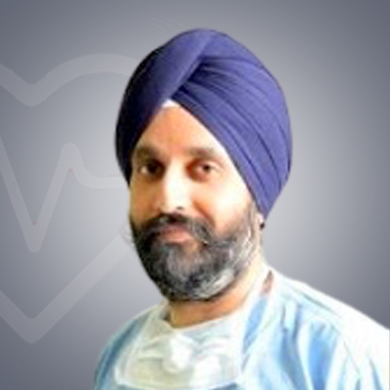
Spine & Neurosurgeon
Medanta - The Medicity , Gurgaon, India18 Years of experience
Speaks: English
Dr. Karanjit Singh Narang is a highly skilled and experienced neurosurgeon in the Delhi-NCR region. He is currently Associate Director, Institute of Neurosciences at Medanta Medicity, Gurugram. Dr. Narang has completed his M.B.B.S from Maulana Azad Medical College, New Delhi in the year 1999. Later, he completed his M.S. (General Surgery) from Safdarjung Hospital & Medical College, Delhi University in 2003. In the year 2006, he was awarded M.Ch. (Neuro Surgery) by AIIMS, New Delhi. Dr. Narang was awarded a fellowship in advanced spine surgery at the Department of Neurosurgery, Munich Technical University, Munich, Germany. He got exposure to the advanced techniques of perming minimally invasive surgery while pursuing a fellowship at Wooridul Spine Hospital, Seoul, Korea. He was also associated with Vardhman Mahavir Medical College & Safdarjung Hospital.
Dr. Karanjit Singh Narang is specialized in Neurosurgery, Spine surgery, and Brain tumor surgery. His areas of treatment include endoscopic neurosurgery, complex skull base procedures and surgery for brachial plexus injuries disc replacement surgery and complex spine surgery, and endoscopic pituitary surgeries. He is also the recipient of the Quality Champion for NABH. He is an expert in performing brain tumor surgeries by using the latest and advanced navigation techniques. Various papers of Dr. Narang have been published in national and international journals.
A neurosurgeon is a medical specialist who diagnoses and treats conditions affecting the nervous system, including the brain, peripheral nerves, spinal cord, and spine. Neurosurgeons offer non-operative as well as surgical treatment to patients. Here is a list of some of the conditions Dr. Karanjit Singh Narang treats:
Some of the signs and symptoms of neurological disorders are listed below. Consult your doctor/neurosurgeons if you experience any of these symptoms. Early detection of the condition can help control the severity of the symptoms and can be effectively treated. The below symptoms should be discussed with a neurosurgeon who will advise required diagnostic tests and start appropriate treatment.
Neurological disorders can cause mixed symptoms, such as difficulties in moving, speaking, learning, swallowing, breathing. According to brain specialists, there are more than 600 neurologic diseases that cause mild to severe symptoms. Having a neurological disease could have a deep impact on the patient’s life. It is very important that a person should seek medical advice from a neurologist.
The working hour of doctor Karanjit Singh Narang is 11 am to 5 pm from Monday to Saturday. The doctor has an off on Sunday. Sometimes, the doctor may not be available on the working days, so it is always suggested that you confirm the doctor’s availability before you visit him.
Dr Karanjit Singh Narang is a renowned neurosurgeon who performs a number of popular procedures mentioned below::
With a rich experience in neurosurgery and having a record for performing a number of successful brain surgeries with a high success rate, the neurosurgeon has received global recognition for their holistic approach. Patient safety is the top priority for the doctor who follows all medical protocols and provides care of international standards. Also, the doctor can handle even the most complicated cases with ease.

Share Your Experience about Dr. Karanjit Singh Narang

Dr. Karanjit Singh Narang is a renowned neurosurgeon who is known for his patient-centric approach and high success rate. The doctor evaluates the condition of the patient completely before performing any procedure to understand the risk associated with the procedure. With vast experience in performing even the most complex cases with high precision and accuracy, the doctor follows medical protocols in order to ensure patient safety. Also, the doctor is abreast with the latest techniques. Neurosurgeons work in different settings like private clinics and public or private hospitals. They often collaborate with other specialists and medical professionals as per the requirement of surgery. They also evaluate the condition of the patient before performing surgery in order to find the complications of the surgery, if any.
Diagnosis tests act as an important tool to find out the condition(s) a patient is suffering from. So, a neurosurgeon will ask you to get a few tests done so that they get to know the cause of the symptoms which further helps in finding the condition the patient is suffering from. Based on the diagnosis, the doctor can start appropriate treatment. For a complete evaluation of your condition, you have to undergo neurological examination which may include the following:
Some of the diagnostic tests required before and during a consultation with a neurosurgeon are::
If you show the below symptoms, consult a neurosurgeon who will diagnose the condition and suggest the right treatment.
Dealing with the entire nervous system, neurosurgeons treat all the parts of the body that are affected by nerve issues. They do complex surgeries on the brain. Before starting treatment, they diagnose patients' symptoms and design minimally invasive treatment plans.